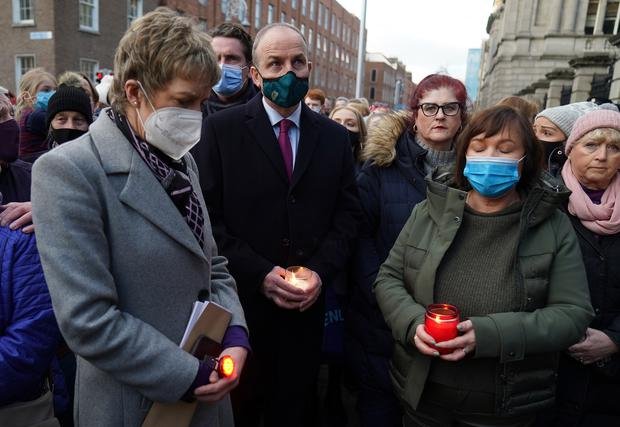Enough Of The Fake Outrage - Government Must Deliver For Women
The brutal murder of Ashling Murphy sparked an unprecedented wave of vigils across Ireland and beyond. Tens of thousands of people spontaneously took to the streets to demonstrate their support for Ashling’s family and to demand an end to violence against women.
This mass outpouring of public grief, solidarity and anger was only only matched by the outpouring of fake outrage, rhetoric and empty promises from an Irish political establishment which has failed Irish women for generations.
Vigil for Ashling Murphy in Tullamore, Co Offaly
The attitude of the Dublin government toward the Council of Europe Convention on Preventing and Combating Violence Against Women and Domestic Violence tells a truth that contradicts the hollow words that followed the slaying of Ashling Murphy.
Better known as the Istanbul Convention, the agreement was adopted by the Council of Europe in 2011 and came into force in 2014. It took the Dublin government another five years to ratify the convention in 2019 - only after 33 other European countries had already done so.
The convention, which is legally binding on all states that have ratified it, aims to prevent violence against women, protect women from violence, ensure that perpetrators of such violence are prosecuted and to co-ordinate policies across Europe. It outlines a range of measures to be taken by particpating states to meet these objectives.
While an independent panel is due to visit the Twenty-Six Counties this year in order to assess compliance with the provisions of the convention, it it already abundantly clear that the actions, and inactions, of successive governments fall far short of the rhetoric of recent days.
The Twenty-Six Counties only ratified the Istanbul Convention in 2019 - the 34th country to do so. The British state, in control of six Irish counties, has signed but not yet ratified the convention
One requirement of the convention is that figures on the number of femicides, and the relationship between the perpetrator and the victim, are collated so that trends can be identified, for awareness raising and for prevention purposes. The Dublin government has failed to do so, instead leaving it to a charity, Women’s Aid, to do this critical work.
The only effort the Southern state has made to look at this topic was the establishment of a Study of Familicide and Domestic Homicide Reviews. Convened in May 2019, over three and a half years later this group has yet to publish anything. In the Six Counties, where the British state has yet to even ratify the Istanbul Conventions, there is no official data relating to femicides.
Haven House, a women’s refuge in Dublin City
Another important aspect of the convention is the provision of support services for women. An umbrella group of organisations that provide services to female survivors, Women Against Violence Europe (WAVE), has recently published an in-depth report on how signatories are doing in this regard. It found that there is chronic shortage of secure women-only refuges in the Twenty-Six Counties.
Éirígí has previously highlighted the absence of a women’s refuge in Dún Laoghaire Rathdown, as an individual incidence of a much wider problem.
Across the entire state, there were only 129 beds in women-only refuges in 2020 — a scandalous 29% of the recommended number. This resulted in 1,351 women being denied refuge in the period from March to August 2020 - 1,351 women who were failed in the most serious of ways by the government and the state.
In relation to the obligation to provide a sufficient range of supports through women’s centres and services for survivors of sexualised violence, it is unclear if the the Istanbul Convention is adhered to as neither the Southern or Northern state keeps sufficient records to make that judgement.
Micheál Martin and his government now need to deliver on their legal commitments to Irish women
A further complication facing women trying to flee abusive relationships or trying to access services is the poor provision of public transport in many areas of the Twenty-Six Counties, most particularly in more remote rural areas where public transport is virtually non-existent.
So, when establishment politicians decry the current lot of women in our society, it is worth remembering their abject failure to live up to their moral and legal commitments to the women of this country. Ireland has had enough of the fake outrage that follows every high-profile murder of a woman.
Like much of Irish society, Éirígí will be closely monitoring the actions of government in the coming months. And we’ll be highlighting and challenging any failure to deliver on the many promises that were made in the aftermath of the murder of Ashling Murphy. This, and future, governments must deliver meaningful change for the women of Ireland.





